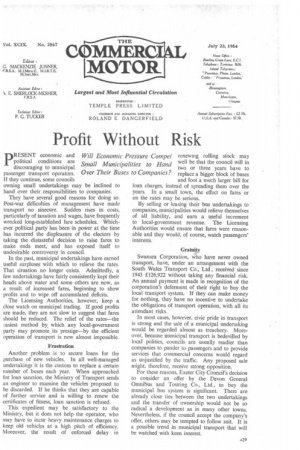Profit Without Risk
Page 31

If you've noticed an error in this article please click here to report it so we can fix it.
pRESENT economic and political conditions are discouraging to municipal passenger transport operators. If they continue, some councils owning small undertakings may be inclined to hand over their responsibilities to companies.
They have several good reasons for doing so. Post-war difficulties of management have made transport no sinecure. Sudden rises in costs, particularly of taxation and wages, have frequently wrecked long-established fare schedules. Whichever political party has been in power at the time has incurred the displeasure of the electors by taking the distasteful decision to raise fares to make ends meet, and has exposed itself to undesirable controversy in council.
In the past, municipal undertakings have earned useful surpluses with which to relieve the rates. That situation no longer exists. Admittedly, a few undertakings have fairly consistently kept their heads above water and some others are now, as a result of increased fares, beginning to show profits and to wipe off accumulated deficits.
The Licensing Authorities, however, keep a close watch on municipal trading. If good profits are made, they are not slow to suggest that fares should be reduced. The relief of the rates—the .:asiest method by, which any local-government party may promote its prestige—by the efficient operation of transport is now almost impossible.
Frustration Another problem is to secure loans for the purchase of new vehicles, in all well-managed undertakings it is the custom to replace a certain number of buses each year. When approached for loan sanction, the Ministry of Transport sends an engineer to examine the vehicles proposed to be discarded. If he thinks that they are capable of further service and is willing to renew the certificates of fitness, loan sanction is refused.
This expedient may be satisfactory to the Ministry, but it does not help the operator, who may have to incur heavy maintenance charges to keep old vehicles at a high pitch of efficiency. Moreover, the result of enforced delay in renewing rolling stock may well be that the council will in two or three years have to replace a bigger block of buses and foot a much larger bill for loan charges, instead of spreading them over the years. In a small town, the effect on fares or on the rates may be serious.
By selling or leasing their bus undertakings to companies, municipalities would relieve themselves of all liability, and earn a useful increment to local-government revenue. The Licensing Authorities would ensure that fares were reasonable and they would, of course, watch passengers' interests.
Gratuity Swansea Corporation, who have never owned transport, have, under an arrangement with the South Wales Transport Co., Ltd, received since 1943 £126,922 without taking any financial risk. An annual payment is made in recognition of the corporation's deferment of their right to buy the local transport system. If they can make money for nothing, they have no incentive to undertake the obligations of transport operation, with all its attendant risks.
In most cases, however, civic pride in transport is strong and the sale of a municipal undertaking would be regarded almost as treachery. Moreover, because municipal transport is bedevilled by local politics, councils are usually readier than companies to pander to passengers and to provide services that commercial concerns would regard as unjustified by the traffic. Any proposed sale might, therefore, receive strong opposition.
For these reasons, Exeter City Council's decision to consider an offer by the Devon General Omnibus and Touring Co., Ltd,, to buy the municipal bus system is significant. There are already close ties between the two undertakings and the transfer of ownership would not be so radical a development as in many other towns. Nevertheless, if the council accept the company's offer, others may be tempted to follow suit. It is a possible trend in municipal transport that will be watched with keen interest.




























































































